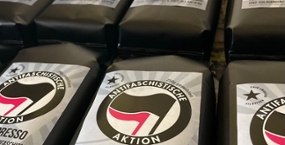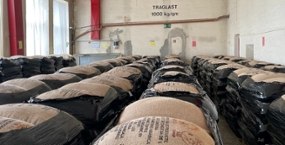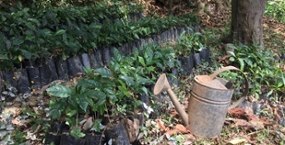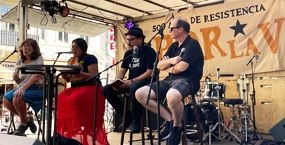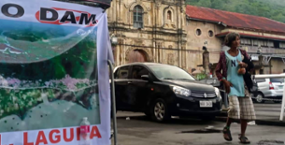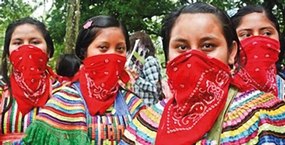Social-ecological struggles, repression and solidarity
Interview about the Resistance against a mega project in the Philippines
Global coordination of local struggles
The extension and utilisation of renewable energy are supposed to be the progressive solution to current crises. They are expected to alleviate shortages and stop man-made climate change. Some people are even dreaming of a “Green New Deal” promising an ecological and socially fair future. 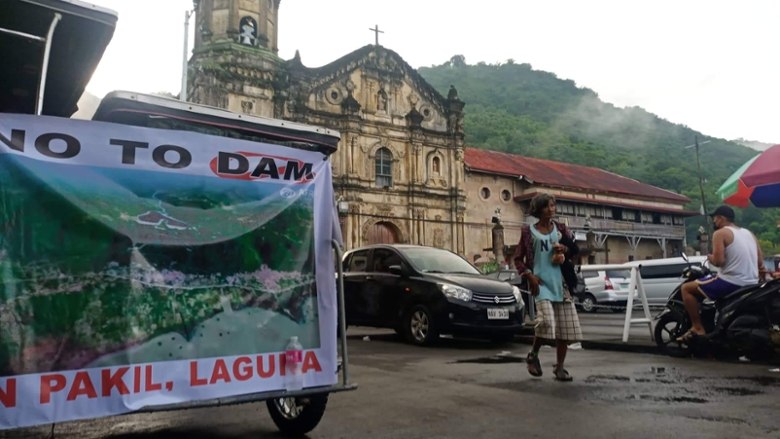
However, at the crossroads of growth ideologies, interest-based policies and profit-seeking there are destructive dynamics at play, even based on green foundations. Proclaiming allegedly sustainable energy production and securing required resources, entire regions in the global south in particular are being devastated by capitalist land-grab and the depletion of natural resources. The environment and the regions' local people are faced with the negative consequences; traditional colonial conditions of inequality and dependency are reproducing themselves.
Massive repression is the frequent answer to developing protest and resistance. In Mexico, for instance, indigenous population groups are frequently fighting against respective projects and for their autonomy and self-determination. They are facing massive violence including the vanishing and murder of activists.
Frequently, indigenous communities are suffering from climate change's consequences directly. They are standing on the frontline of the fight against its consequences and are offering numerous experiences supposed to be recognised more intensively.
Right from Café Libertad's establishment, we have supported the struggles of indigenous communities and social protest movements. What's at stake is a global perspective of solidarity. A necessary requirement for this is the creation of connecting lines across the continents' geographies and the regional social struggles.
The Ahunan Hydropower Dam Projekt in the Philippines
Conflicts regarding energy and resources can be found in the Philippines as well. To tackle the ongoing energy crisis, the government is relying on allegedly sustainable mega projects besides natural gas extraction and the import of liquid gas. One part of this is the Ahunan Pumped-Storage Hydropower Dam with an investment amounting to US$ 1,1 billion and projected power generation of 1400 MW.
The Ahunan Project presents a combination of a hydropower station and a dam located in Laguna de Bay and the surrounding mountains of the Pakil community. Enrique Razon, one of the Philippines' richest men, is behind the contractor company Prime Infrastructure Capital Corporation. This Project is threatening nearly 300 hectares of rainforest and far-reaching negative consequences affecting the entire region are to be expected.
Resistance throughout the population is growing and various groups have joined forces to establish a campaign. As a result, the permit couldn't pass as smoothly as had been intended by the administration. But there is still a way to go, particularly as the development of really sustainable perspectives on an entirely different whole is concerned.
We have talked to an activist from Manila about the project and the resistance. His report is illustrating the Philippines' political situation and repressive climate, the chances and limits of local protest movements and we have been discussing questions of transnational solidarity and the entanglement of different struggles.
Interview with an Anti-Ahunan Project Campaign's activist
Café Libertad Kollektiv (CLK): Thank you for being available for this interview and giving us the opportunity to share your knowledge, experiences and perspectives. Would you please start by introducing yourself?
»My name is C., founding member of Etniko Bandido Infoshop and Community Resource Center, an initiator of Defend Ecology Network and part of a loose network called Local Autonomous Network.«
CLK: Could you give a brief summary who is participating in the campaign against the dam and what activities have already taken place?
»The main front liner of the campaign is the community called MANAPAK (Mamamayang Nagmamahal sa Pakil) a group of elders residing in Pakil town with their support network like us from Defend Ecology Network, Center for Environmental Concern, Philippine Movement for Climate Justice and some small collectives of youth in Laguna region.
Last year 2022, most of our activities have been writing letters to different government agencies, dialogues with community leaders, meetings with directors and secretaries of Department of Environment and Natural Resources, signatures campaign, community-led action like ‘Really Really Free Market Against Ahunan Hydropower project’, consolidation of different youth, artist and musician in every music camp event, film showing and info-sharing campaign, media workshops and producing documentary films, banners, statements, flyers and social media pages.«
Project critique and campaign aims
CLK: The company and politicians claim producing "clean energy" at the hydropower plant. How far is this true or to what extent is greenwashing being practiced here?
»According to the proponent, the pumped storage scheme is utilizing the water from Laguna de Bay to circulate it through the underground power waterways to an artificial upper basin. All components are constructed underground, leading to a minimal environmental impact. Furthermore, it is identified by the Department of Energy (DOE) as one of the clean energy contributors in the Philippines. [1]
But for us this is not true. There is massive ecological impact that will happen once the project is pushed through and the communities around will suffer the most.
- # The project area is highly susceptible to landslides and earthquakes according to Hazard PH.
- # An imminent danger of flooding.
- # The flora and fauna, especially fruit trees, will be eradicated once the construction starts. There is a native tree - called Ibuli, a local chestnut - now a protected tree in the town of Pakil, Laguna after the local government approved an ordinance declaring Ibuli as the town's flagship species for conservation.
- # The natural stream and public swimming pool that the locals believe cure diseases will dry out.
- # Livelihoods in the mountain and the bay area will be affected, like the production of marine life in Laguna de Bay.
The major benefactor of this project is the mayor of the local government unit of Pakil and his associates who have sold the future of their town.« 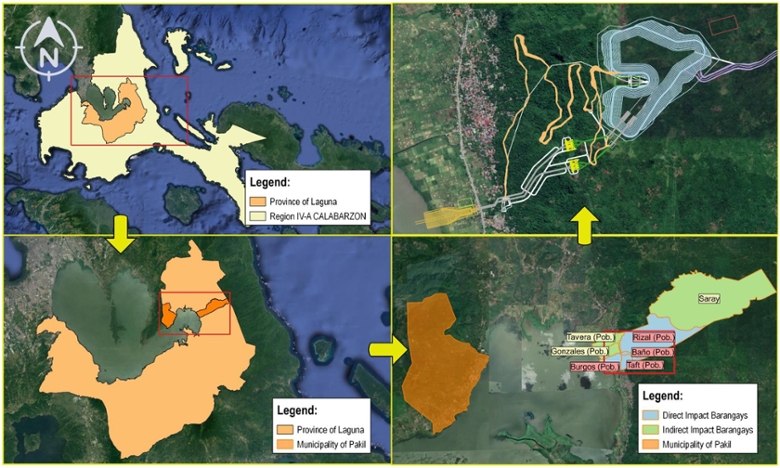
CLK: What other concerns and criticisms exist among opponents of the project? What are the campaign and its various participants aiming at?
»The major concern among the opponents is that the project is illegal in the first place, as there has been no public consultation and the politicians have agreed without asking consent from their citizens or the stakeholders and signed the agreement with the proponent Ahunan Hydropower without a further study or permits coming from the Department of Environment and Natural Resources.
The community wants the agreement to be cancelled and revoked. They are aiming for legal damages and prosecuting politicians, especially the Mayor and his associates who agreed on this project. They want the DILG (Department of Interior and Local Government) and the National Government to intervene in the case questioning the legality of the project.«
On our part, we want to increase pressure on all agencies to take responsibility as we will do every measure it will take for them to take action.
CLK: As anarchist or autonomous activists – what is your role and perspective in the struggles?
»As a decolonize anarchist, I am more interested in recognizing local indigenous values as a foundation for anarchist thought, practice and values rather than Western anarchism. [2] When I involved myself in this campaign, my main role has been to provide campaign paraphernalia, assisting the communities through training and facilitating dialogues and meetings, linking and networking for possible support groups like lawyers or media practitioners, organizing public events and popularization of the issue as much as possible. All of these attempts made me realize the weight that is too much for me to handle. I am an individual who had a small network of friends who are supporting me based on their capacity. It needed to spend time, money, ideas and effort to make this solidarity work possible and we are autonomous - that’s why sometimes we needed to compromise in some matters to continue our relationship with the local communities involved. I am learning a lot as it is new for me to be involved in such a particular issue for a long time, because before if I just wanted to support environmental campaigns, I would just provide campaign paraphernalia and do documentary videos but for this campaign it needed more than that.«
National energy policies and perspectives of the ecological movement
CLK: Form here it’s difficult to get the full picture. Can you give us some background information to understand the project and the politics behind it?
»The Philippine power sector currently relies largely on fossil fuels (about 77 %) and is expected to increase the use of coal-based plants to meet future energy demand, which would negatively affect environmental outcomes. According to the Department of Energy, the development and optimal use of the country's renewable energy resources is central to the Philippine's sustainable energy agenda. Renewable energy is an essential part of the country's low emissions development strategy and is vital to addressing the challenges of climate change, energy security, and access to energy.
The National Renewable Energy Program (NREP) outlines the policy framework enshrined in Republic Act 9513. It sets the strategic building blocks that will help the country achieve the goals set forth in the Renewable Energy Act of 2008. The NREP signals the country's big leap from fragmented and halting RE initiatives into a focused and sustained drive towards energy security and improved access to clean energy.
The NREP sets out indicative interim targets for the delivery of renewable energy within the timeframe of 2011 to 2030. Meeting the massive targets up to 2030 will be challenging as detailed planning, financing, and building of renewable energy infrastructure will have to be undertaken at a scale, and within a time frame, never done before.
As I see it, there is a global call for clean energy in relation to climate crises but how to implement it here locally is still a question. They see hydropower and solar power generators as attempts to decrease carbon emission but the problem is the ongoing concentration on how to make profit rather than to find a way for better energy consumption or better alternatives less damaging to our ecology. But for me, there is no clean energy solution even if it’s made by wind turbine, solar panels and the like as most of it still requires raw materials that need mining extraction. We need to question the scale and the necessity for energy consumption to provide alternatives that are less damaging.
As of today, progressive movements now are engaging in issues related to climate change and environmental struggle but still not enough as the mainstream movement is divided. There is a small number of advocates who seriously tackle the ecological issue as an important foundation of every struggle. There is need of much support for indigenous communities to defend their land, identity, way of life, culture and self-determination.«
Marcos, Duterte and back?
CLK: In the elections in early 2022, Marcos Jr. - the former dictator's son - was elected president; vice president is the daughter of the previous incumbent Duterte who in our view gained notoriety primarily for his murderous anti-drug campaign. What has changed under the new government, what can be expected and how does it affect the dam project and the campaign?
»Oh yes, the newly-elected president and vice-president are famously known coming from fascist families. In general, we expect the worst yet to come especially in the issue of human rights violation. Although the War on Drugs campaign slightly ended after Duterte’s term, all of his allies in the police and the military are still in position. What we expect from the daughter of Duterte is a massive crackdown against dissidents, student activists, environmental defenders and the like as she requests a confidential fund under the proposed P710 billion budget for 2023, pointing out a ‘direct link’ between basic education and national security. It will be hard on us in the future and we need an escape plan if something gets worse.«
CLK: The Philippines have a long tradition of political repression by the state, as well as by paramilitaries and organized crime. There are reports that under the Duerte government there was massive ‘red-tagging’, i.e. the discrediting and persecution of activists as supposed supporters of the communist New People's Army (NPA). How did you experience this and how has the situation developed since the elections?
»Red-tagging was very rampant at the time of Duterte’s regime and it will continue in order to silence supporters of the Communist Party of the Philippines and the New People’s Army as the newly-elected vice-president is more engaged in changing indoctrination, she will be the head of the Department of Education with the support of the military.
On our part, anarchists/autonomists are invisible in some way and it seems that we are no threat to the State so they focus their attention on the CPP/NPA because they are more capable as they have an armed wing component and are highly organized. But we don’t put our guard down as the State sees us all the same. In our experience, we don’t have problems at the moment as we portray our activism in a very different, non-traditional, new and creative approach that the State apparatus cannot easily recognize compared to the authoritarian-left wing.«
Legalism, street protests and repression
CLK: As you mentioned earlier, there are mainly legal and formal activities taking place in the campaign against the dam project. What is the significance of street protests and direct action in relation to this, and what role does repression play?
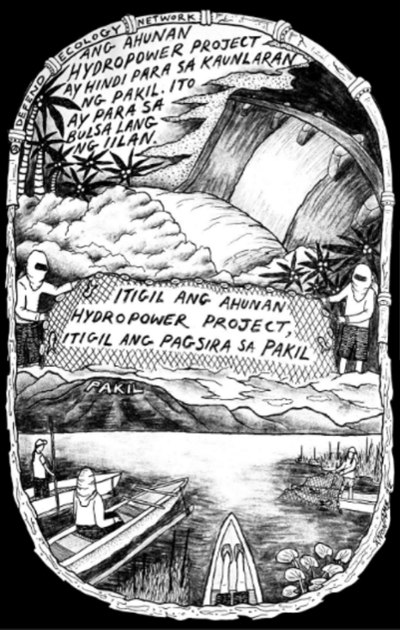
For the eighth straight year, the Philippines was named the deadliest country for land and environmental defenders in the Asian continent, according to an environmental watchdog. In its 2021 report, non-governmental organization Global Witness said it had recorded a total of 29 documented killings of “people defending their homes, land and livelihoods, and ecosystems” in the Philippines alone. In 2019, the Philippines had held the top spot with 43 recorded deaths.« [3]
CLK: What have your particular experiences regarding repression been so far in the current campaign? What else do you have to reckon with and how do you deal with it?
»In June 2022, a member of MANAPAK was arrested in Pakil town and imprisoned after a public discussion regarding the proposed Ahunan Hydropower project. She was arrested as part of the red-tagging of the government. [4]
On our part, on the other hand, we haven’t experienced serious repression so far aside from threats that we heard when we were visiting the communities and our contacts in the area always remind us to be vigilant when we are visiting their place. If we have this situation, we just lay low a bit and communicate with our local contacts online to get an update so we don’t need to go to a place to lessen our anxiety and paranoia.«
Next steps, trans-national perspectives and solidarity
CLK: What's ahead? What is your further strategy and what is planned next?
»The future plan is to expand our work to two different provinces, Laguna and Quezon province as there are also proposed eco-destructive projects like the Belisama Hydropower project in Pangil Laguna and seabed mining in Tayabas Bay.
We have five major activities/plans ahead like participatory rural appraisal/ community research, video production, publication, workshop/education to be used as a backbone for our campaign depending on our capacity and some are already ongoing. All of these major activities are designed to equip and strengthen communities in resistance for a long and exhausting battle.«
CLK: In general, to what extent do you see yourselves connected to social/political/ecological movements in other countries and on other continents? How does this express itself?
»It is very important to us here in the so-called Philippines to always be connected to the international movement to exchange and share inspiration, strategy and ideas to develop more egalitarian, community-centered projects and initiatives towards the fight against injustices and inequalities.«
CLK: At Café Libertad we recently also discussed what connections there are between your struggle and the situation in other countries. For example, we have in mind the situation in Mexico, where mainly indigenous communities are fighting against large-scale capitalist projects and their destructive consequences, and are self-organizing for "land and freedom". What are your thoughts on this?
»I am really fascinated and curious about the self-organizing resistance of the indigenous communities in Mexico particularly the people of Chiapas. We don’t have it here. I am also wondering if it were possible that in some way they can visit us here and we can organize a different forum and engagement with other indigenous communities here or with any other local organization to promote and exchange stories and experiences about local resistance.«
CLK: To proceed with the struggle, what do you need? What can be done on an international scale of solidarity?
»I wanted to ask if there is a way for comrades in the international community to pressure the Philippine government and do it in their respective localities. One of the reasons why the massive numbers of killings related to War on Drugs were minimized was because of international pressure.«
The interview was conducted in written form and in English in early 2023.
_ _ _ _ _ _ _ _ _ _ _ _ _ _ _ _ _
[1] An impression of detailed plans, official assessments and presentations can be gathered from a scoping document on the Environmental Impact Assessment and Management Division's website (EIAMD): https://eia.emb.gov.ph/wp-content/uploads/2022/02/C.-Ahunan-Project-Description-for-Scoping.pdf
[2] Historian, writer, and activist Maia Ramnath has written a book titled Decolonizing Anarchism. The book examines the history of South Asian struggles against colonialism and neocolonialism, highlighting lesser-known dissidents as well as iconic figures. What emerges is an alternate narrative of decolonization, in which liberation is not defined by the establishment of a nation-state. Author Maia Ramnath suggests that the anarchist vision of an alternate society closely echoes the concept of total decolonization on the political, economic, social, cultural, and psychological planes. Decolonizing Anarchism facilitates more than a reinterpretation of the history of anticolonialism; it also supplies insight into the meaning of anarchism itself. The book can be purchased through the AK Press collective but is also available for free as a PDF.
[3] Global Witness is an environmental group that focuses on holding companies and governments accountable for the destruction of the environment. Annually, the group releases a report to reveal the statistics of killed land defenders in different countries. A 2019 report titled Defending the Philippines is available on the organization's website. It mentions at least 30 murdered rural and environmental activists in 2018.
[4] A campaign press release states: “On June 11th, 68-year-old environmental defender Daisy Macapanpan, one of the leaders of the community opposition, was arrested in her home for ‘rebellion’ after delivering a speech against the project. Allegedly by 40 police officers with no warrant. She was released on August 10th on bail. Illegal detentions and arrests of environmentalists are common in the Philippines.”
